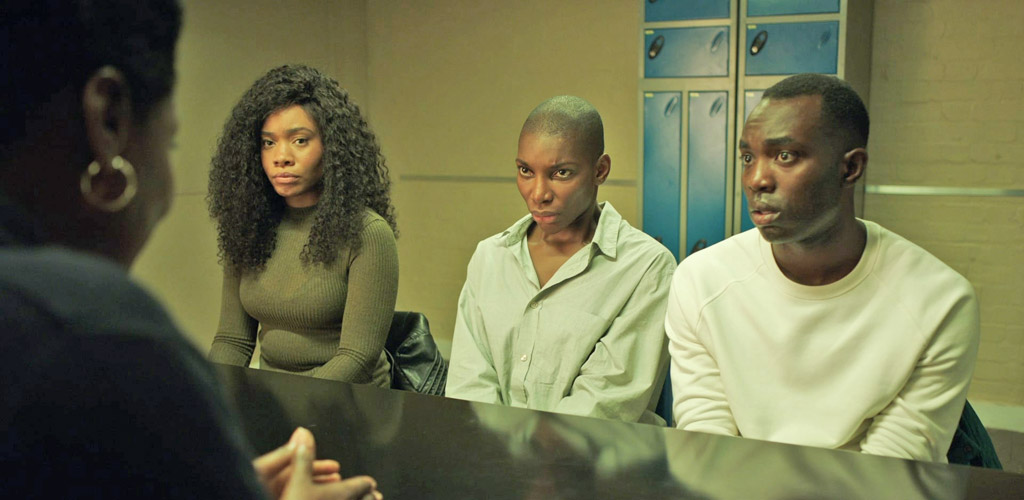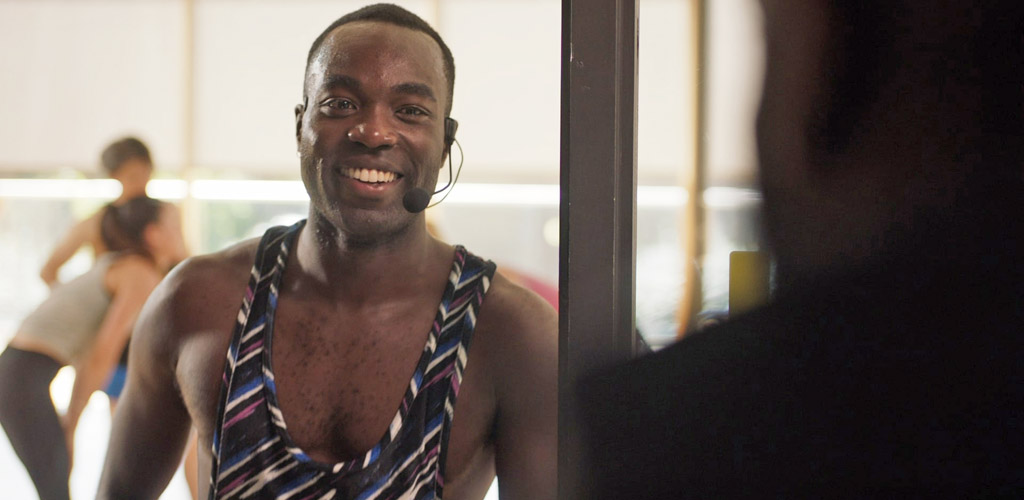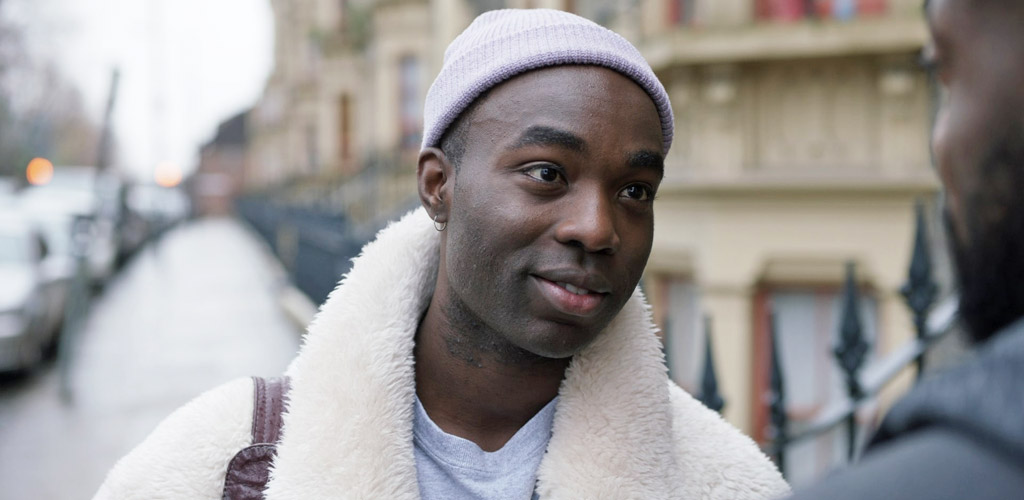
I May Destroy You easily nabbed the #2 spot on our Top 10 Shows Of 2020 So Far list. Michaela Coel created and wrote the series, and she stars as Arabella, but Michaela also brought an old friend along to play one of her good friends. Paapa Essiedu went to drama school with Michaela, but he explained to us how he definitely earned the role of Kwame, who supports Arabella following her rape in numerous ways. That includes accompanying her to the police station, but when Kwame suffers his own sexual assault, he heartbreakingly travels all by himself to report being raped. One there, the detective who listens to Kwame’s story turns him away without taking the thought of pressing charges seriously at all.
It’s a devastating turn of events on this TV show, which explores the various forms that sexual assault take through Coel’s scripts. Kwame’s trauma begins in the season’s fourth episode, when he’s raped by a man with whom he had consensual (protected) sex with earlier that evening. The events that transpired throughout that night also bring his friendship with Arabella into question, and Paapa’s layered performance of Kwame shines light upon a perspective that we rarely (if ever) see on TV.
Paapa was gracious enough to hop onto a Zoom call with us to discuss how he loved wearing his character’s various masks on I May Destroy You as the show continues to fearlessly deliver truths to the HBO audience.
You and Michaela go way back. How does it feel to watch her success and be a part of it?
Yeah, I mean, as a viewer and as a punter, which is mainly what I am, being her friend, it’s amazing! All you wanna do is see your friends [succeed], and this is like the front cover of a magazine for your friends. I’m so proud of her, and even being involved in this kind-of takes a backseat to that, actually. When I watch the work, the show, it’s mainly pride that’s the front-end sense for me.
How did you learn that you were going to be playing Kwame, and were you privy to any of Michaela’s scriptwriting as it happened?
I obviously would be talking to her when she was writing, and talking about it, but she never thought it was me that was going to be doing it. It was a very last-minute.. well, I auditioned for it. She was maybe having a hard time finding the right person or whatever, and then the casting director said to her, “Well, what about Paapa?” And she was like, “What, really?”
That was a very flattering reaction, I’m sure.
And it was the casting director who pushed it through. When we actually started working on it, though, it was very easy to get into it.
Did this role stick with you when you went home at night?
I think I was actually okay because I’ve done a lot of plays, and a big part of the ritual of doing a play is to try not to bring it home with you, which I’m sometimes good at and sometimes not good at, but the one thing that I did need was that — after we finished filming — I did need to go do a play for a couple of months, just to not think of that project, and then I came back to it.
How did you wrap your mind around bringing this nuanced view on sexual consent, and a type of character we rarely see, to TV?
I guess, of course, the responsibility is great, in terms of it being an underrepresented story in terms of television. I don’t even know if I was thinking about that when we were doing it. I guess I was, but it was mainly about doing it justice and investing the character in his journey with truth and integrity and honesty and realness. That’s the only thing that I, as an actor, can concern myself with, as opposed to how people may or may not receive it. And I felt very privileged to be given the opportunity, but the privilege was connected to the challenge, which was to do it justice.
One layer of Kwame is that he’s introverted, but he’s also an aerobics instructor, so he’s used to shifting into extroversion, and shifting gears in general. Do you think that has anything to do with how he processes his trauma?
Oh, one-hundred percent, but I think, like, all of us kind-of are [that way], but I think that he is more complex than the rest. I really wanted to have that approach to him early, from the genesis of making the character. He has the ability to be super introverted and super introspective and quiet and with himself, but he’s also got the ability to, like you say, run an aerobics class or try to be in front of his friends and show videos of people that he’s gonna f*ck and all of that. He’s got this real confident, tough exterior, but they’re all masks. They’re all different versions of himself, and sometimes he’s got this one on, and sometimes he’s got that one on. And that was the case with all of us. That was the amazing thing, to excavate and explore this character.

Do you think that Kwame gets any closure toward the end of the season?
I don’t even think that closure is what he’s necessarily looking for and needs. I think that closure is a difficult ideal for him to fully grasp because with that kind of trauma, it stays with you. It’s more about how it metamorphosize and becomes something else to you. I don’t know if that’s what he gets, but I have hope for [he and Arabella’s] relationship.
The show uses intimacy coordinators, which are a relatively new thing. Did that change the experience for you?
Hugely. I can’t imagine this kind-of sensitive and delicate material being produced safely without one right now. Because I’ve been lucky on previous projects to have worked with very experienced actors who have been upfront and certain about what they’re capable and comfortable doing and what they’re not, so that’s great because everyone knows where they stand, but there are so many other versions of that where no one knows where they stand, and they make it up as they go along, and that’s not an area where you want to improvise, really because you’re going to infringe on someone’s boundaries. So an intimacy coordinator just helps you concentrate on the actual scene, because there’s communication, and everyone feels safe and comfortable and focus on the task at hand, which is to tell a story.
It’s a hell of a story. Do you have hopes for a second season?
I really love, but I can’t really — yet — imagine the characters outside of the parameters that have been set for them so far in this circumstance. That’s what we played it for, and we never set it up for [the event that] somebody will say, “You can tell this story some more.” There’s a totality in the twelve episodes that we’ve made, so the curiosity is very much sated by that.
Sometimes there’s a fear that a second season can’t live up to a first.
We’ve told the story that we’ve wanted to tell, and it’s quite a brave and radical thing we’ve done… but who knows what the future will hold.
Well, if you could give Kwame a holiday on any other show, what would it be?
I’d like to see Kwame on Succession, I think because basically, I love Succession. I also think that show needs this type of character to disrupt things.
‘I May Destroy You’ airs on HBO at 10:00pm EST on Mondays.

